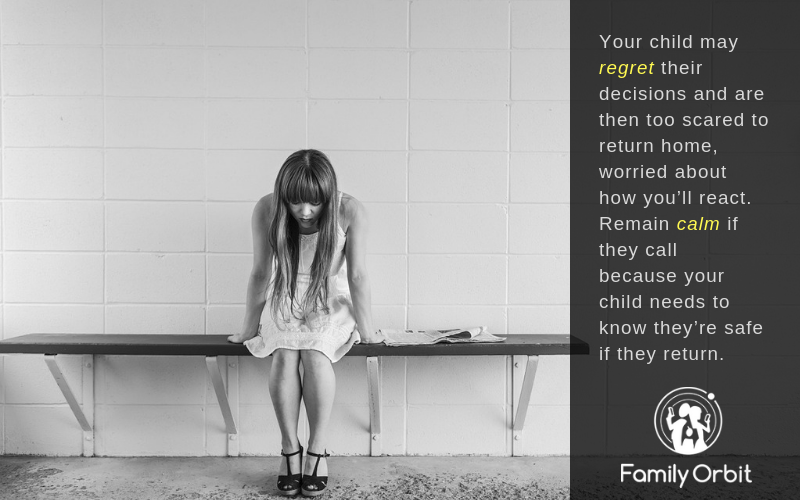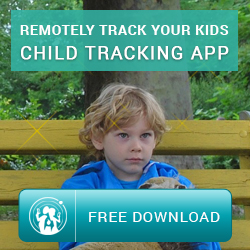One of the biggest nightmares for a parent is a child running away from home. They can leave home for all types of reasons, but one of the biggest is because they don’t feel wanted, respected, or needed. It’s natural to panic and be angry at first, but try to put those emotions to one side for now. You need to think calmly and clearly.
Your child running away from home isn’t the end of the world and there is a chance you already know where they will have gone. You can find them and discuss their actions calmly and collectively. No, it’s certainly not going to be easy, but here are the steps you need to take when your child runs away from home.

Start by Spreading the News
It’s going to be embarrassing but don’t hide away from this. You want to make sure all your friends and family members know that your child has run away. Even if you think you know where they’ve gone, let your immediate family know. The other parent, step-parents, and siblings all need to be aware so they can take steps to help you look.
 It’s also worth calling the friends of your child’s friends. A lot of children will head to somewhere they believe is safe and that often means another friend’s house. Even if your child isn’t there, letting friends’ parents know is important as they can be on the look out.
It’s also worth calling the friends of your child’s friends. A lot of children will head to somewhere they believe is safe and that often means another friend’s house. Even if your child isn’t there, letting friends’ parents know is important as they can be on the look out.
And don’t overlook calling the police. The first 24 hours are crucial, so you want to give the police as much information as you possibly can so they can help you look.
Check Favorite Spots
A friend’s house is a common place for a child to go. They may also go to another family member, wanting to get away from parents but still wanting to be protected and feel safe. The kids know they’ll eventually be found and it’s clear that running away wasn’t to leave but to get some time to think and calm down themselves.
 If you don’t find them at a friend’s check other places that are favorite spots. When kids run away, they head somewhere that feels similar and relatable. They just want a little alone time and are waiting for you to find them.
If you don’t find them at a friend’s check other places that are favorite spots. When kids run away, they head somewhere that feels similar and relatable. They just want a little alone time and are waiting for you to find them.
When you still haven’t found them, it’s time to spread the news further. Get in touch with the school, external family members, and anyone you know can help.
Check for Missing Items
Go through the clothes your child has taken. Some kids run away with absolutely nothing but others go with a plan in mind. Those without anything are usually going to a friend’s house, somewhere they know they will be harbored and helped. Kids that take bags of clothes are heading elsewhere. They’re planning on being alone for a long period of time.
By looking through the missing items, you have an idea of where they could have gone, what they’re wearing, and what to look out for. This helps police, your friends, family members, and more who are looking for your children.
Check Social Media Accounts
Look at social networks, emails, and other forms of tech that have been left behind. More often than not, a child will leave a message somewhere about where they’re going. You may find a private message to a friend that says a specific location. Sometimes they’ll talk in code, but you have the chance of deciphering it.
Even if they don’t giv e a direct idea, looking through bookmarked web pages and search terms will give you a chance to figure something out. When a child runs away there will be planning involved first and this can help you.
e a direct idea, looking through bookmarked web pages and search terms will give you a chance to figure something out. When a child runs away there will be planning involved first and this can help you.
You may even be able to find them through GPS. A lot of children will take their cell phones or other tech devices with them. A parental monitoring app is a good way of finding out where your child is without them necessarily realizing it. If you don’t have one installed yet, make sure it is as soon as possible in the event your child runs away from home.
Remain Calm if They Call
Sometimes kids will call. They may regret their decisions and are then too scared to return home, worried about how you’ll react. The phone call home is a way for them to gauge your mood and whether they’re welcome back. It’s important to remain calm. Avoid being angry at them. Yes, you’re scared and you are angry, but your child needs to know they’re safe if they return.

Avoid being critical on the phone or in your message. Just ask the basic questions to find out where they are. One of the fears is that they’re not alone and have been taken, so you want to make sure they can talk freely and that they’re safe. You want to find out where they are.
One of the best questions you can as is “do you want me to come and get you?” or “do you want me to bring you back home?” This lets them know immediately that they’re welcome and that you’ll help them fix their problem. Once they’re home, you can discuss the reasons why and how it made you feel. Right now, it’s all about getting them back in the house.
The Aftermath
Once you get your child home, you’ll need to take some time to get to the bottom of their reasons for it. Take a break from each other. Now your child is safe, the anger is going to bubble to the surface. But being angry will scare them and they may run again. Taking a break helps to get the emotions under control now the adrenaline has gone from the body.
Once you’re both calm, talk to each other about what led to them running away. Remain collected and don’t accuse them of anything right away. Kids want to be listened to and this is the most crucial time.
